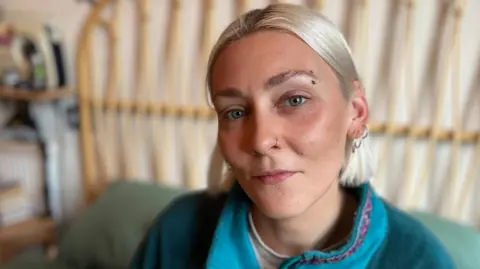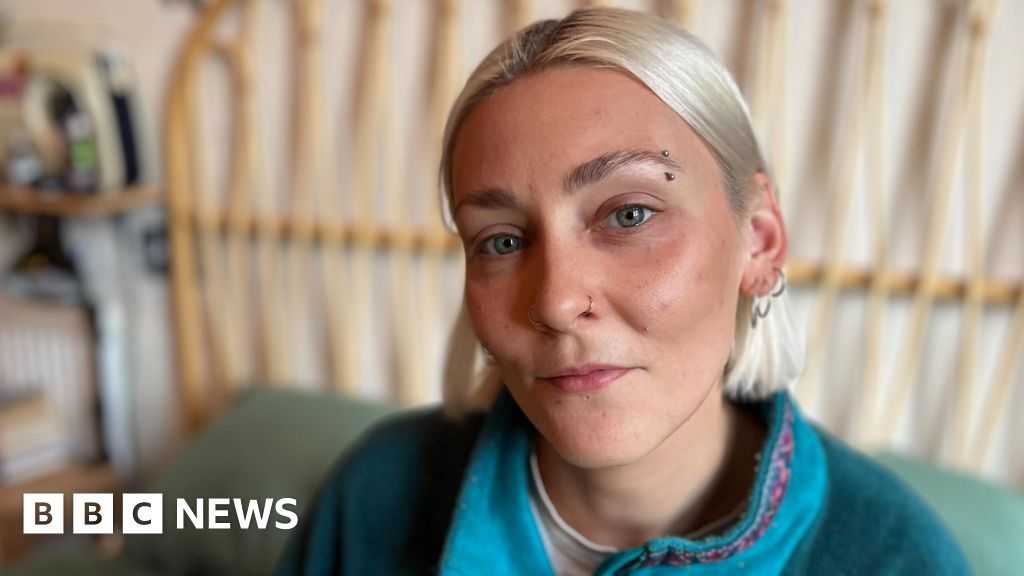Georgina HayesBBC Scotland news
 BBC
BBCGovanhill is one of the most deprived areas in Scotland – but Elle Glenny is still facing the rising cost of living in this part of Glasgow.
The rent on the 31-year-old community worker’s one-bedroom flat in the south of the city has jumped from £590 to £700 a month.
The increase came just months after the landlord served Elle with an eviction notice, which is being challenged at a tribunal.
“I’m now paying up to 50% of my income every single month just to live,” says Elle, who moved into the flat in 2023.
“The impact of the rent increase alone has been catastrophic. I’m cutting back on essentials, which is making my life feel really unliveable and uncomfortable.
“I’ve never missed a rent payment, I’ve never been late for rent… I’ve been a perfect tenant as far as I’m concerned.”
The landlord says the rent increase reflects the market rate for the area.
Elle is also facing eviction because the landlord wants the property back to move in a family member – a legal method through which tenants are allowed to be evicted.
Elle, who uses they/them pronouns, is challenging the move and will remain in the flat while the case is heard by a first-tier tribunal.
Housing charities encourage tenants to remain in their rented property during this process, which can take months.
Elle has not been able to find another affordable flat and wants to secure a place in social housing instead.
However, Elle – who is in recovery from drug and alcohol addiction and receives disability benefits – has been on waiting lists for social housing for almost three years.
Despite having 100 out of the 120 priority points needed, Elle has been told that because waiting lists are so long they would likely have to become homeless before being prioritised for a home.
Elle now fears being placed in temporary accommodation, having to sofa-surf or even ending up on the streets if they have to leave the flat.
“I’m really proud of myself to get to the place that I’m at right now, to keep a stable tenancy and a stable job,” Elle said.
“That does give me more points in the social housing system, but unfortunately not enough to prevent me from having to go through the homelessness system.”
 PA Media
PA MediaThe Scottish government declared a national housing emergency in May last year after coming under sustained pressure from opposition parties and campaigners.
Housing Minister Màiri McAllan is due to announce details of an action plan to tackle the crisis in Holyrood on Tuesday.
She said this would include “direct and immediate action to tackle the housing emergency, strong support for vulnerable communities and significant action to create the optimum conditions for confidence and growth in our housing sector”.
There is no standard definition of a housing emergency and the declaration placed no new legal duties on the government to act.
However, it was an admission from ministers that the current situation needed to be urgently addressed.
One of the main reasons is that demand for housing of all kinds, but especially social housing, is vastly outstripping supply.
In addition, rents are rising in the private sector and the cost of living crisis means that people who previously may not have struggled are finding it harder to afford higher rents or get on the property ladder.
How many new homes are needed?
In 2021 the Scottish government set a target to build 110,000 affordable homes by 2032, delivering 10,000 homes each year.
Affordable housing includes social housing, mid-market rent and affordable home ownership. Campaigners say social housing is needed the most desperately.
A new report has been produced by experts at Sheffield, Liverpool and Sheffield Hallam universities, who were commissioned by Shelter Scotland, the Scottish Federation of Housing Associations and Chartered Institute for Housing.
Their research suggests that at 15,600 new affordable homes now need to be built in Scotland each year.
They estimate this would cost £1.64bn annually, a total of £8.20bn over the next five-year session of the Scottish Parliament.
Shelter Scotland says this is “a very significant increase” and that it has seen “no evidence thus far of an emergency response” from the government.
Director Alison Wilson said: “We face a simple choice – invest in the homes we need now, or pay the price for generations.”
The Scottish Federation of Housing Associations says the research makes clear that ending the housing emergency will require “building a lot more social homes and a radical and sustained increase in the housing budget”.
There are now more than 99,000 households on the waiting list for social housing in Scotland.
This is housing designed for people who cannot afford to buy or rent on the open market, such as those on lower incomes or some with disabilities.
It covers homes which are rented out by councils, housing associations or housing co-operatives at a lower cost than is available elsewhere.
The number of social houses available across the UK fell dramatically in the 1980s after the Thatcher government gave tenants the right to buy their homes at a discount.
Since then, the number of homes built has not matched the number sold off. The right to buy was abolished in Scotland in 2016.
In recent years, the Scottish government has faced intense criticism from campaigners and housebuilders for a failure to build enough homes of all types.
And the number of affordable homes being completed has only reached the 10,000 per year target once in the last decade.
Most campaigners and experts agree that the creation of more social housing offers the best route to get people out of homelessness.
The number of live homeless cases reached a record high in 2024, when it stood at more than 31,000 households.
They are also now over 16,000 households in Scotland living in temporary accommodation, including over 10,000 children. Both these figures are also record highs.
Meanwhile, private rents in Scotland have been steadily rising over the last decade.
The average price for a rented property in Scotland is now £999 per month – compared to £673 in July 2015.
Cities are particular pinch points. Research from Zoopla in 2024 found that Glasgow recorded the highest average rent increases of any UK city over the past four years at 44.4%. Edinburgh also saw average rents rise by 41.3%.
The Scottish government introduced rent controls during the pandemic and cost of living crisis, but these came to an end in April this year.
They will eventually be replaced by longer-term rent controls in the government’s Housing Bill, which will allow ministers to decide which parts of Scotland could come under rent control areas.
These powers, which are expected to come into force in 2027, would limit increases to 6% in those zones.
Campaigners have broadly welcomed these measures – but landlord groups have warned they would exacerbate the housing crisis by putting people off renting their properties and disincentivising investment.
‘Deeply flawed’ system
While tenants wait for this system to be put into place, they can use the government’s rent adjudication system if they feel a proposed increase is unfair.
However, tenants’ rights group Living Rent described the system as a “disaster”.
It said that in 24% of cases, the adjudication actually increased the rent by a higher amount than the landlord’s original proposal.
This is because the increase is measured against open market rents in the area – and this can often be higher than the landlord’s original rent notice, especially in cities with rapidly rising prices.
Living Rent’s national campaigns chair, Ruth Gilbert, said the system was “deeply flawed” and called for protections to be introduced until the new controls come into law.
The Scottish government says it has invested “heavily” in affordable homes, and will be spending £768m this year alone.
The government says it has supported the delivery of 139,000 affordable homes since 2007.
It added: “Along with our significant investment, we are working closely with local authorities so they can acquire more homes, return empty homes to use and prevent homelessness in the first place – including by providing £97m to fully mitigate the UK’s bedroom tax.
“Scotland already has some of the strongest rights in the UK for tenants, and we are taking forward measures in the Housing Bill that will further strengthen these protections.”

